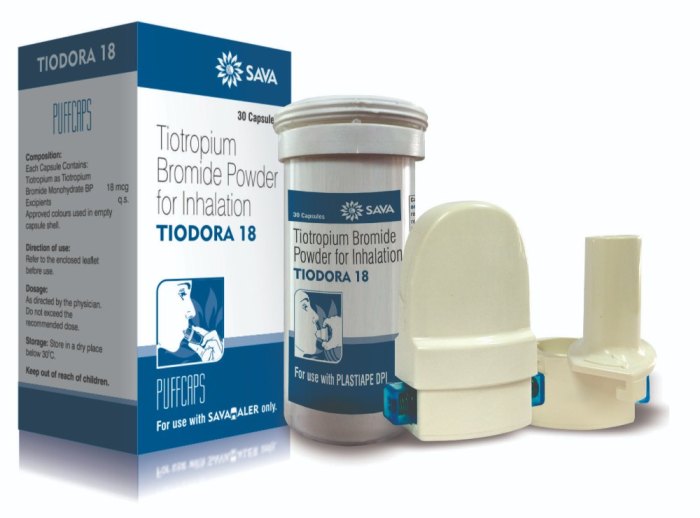Tiotropium bromide is a medication that plays a significant role in managing respiratory conditions. It acts as a long-acting muscarinic antagonist, meaning it helps relax the muscles in the airways, making it easier to breathe. This medication is available in various forms, including inhalers and capsules, making it a versatile treatment option for individuals struggling with lung issues.
Tiotropium bromide is primarily prescribed for chronic obstructive pulmonary disease (COPD), a group of lung diseases that includes chronic bronchitis and emphysema. It is also used to treat asthma, although it is not the first-line treatment for this condition. The medication helps to improve lung function and reduce symptoms such as shortness of breath, wheezing, and coughing.
Contraindications and Precautions

Tiotropium bromide is a medication used to treat chronic obstructive pulmonary disease (COPD). Like all medications, it has potential risks and benefits, and it’s crucial to understand these aspects before starting treatment. This section will delve into the situations where tiotropium bromide is contraindicated and the precautions that need to be considered when prescribing or administering it.
Contraindications
Tiotropium bromide is contraindicated in certain situations due to the potential for severe adverse effects. It is crucial to avoid using this medication in these cases.
- Known hypersensitivity to tiotropium bromide or any of its components: This is a primary contraindication. Individuals with a history of allergic reactions to tiotropium bromide or its components should not use this medication. The risk of severe allergic reactions, including anaphylaxis, is high in such cases.
Precautions, Tiotropium bromide
While not contraindicated, certain conditions and situations require careful consideration and monitoring when using tiotropium bromide.
- Tiotropium bromide can potentially exacerbate cardiovascular disease. Patients with a history of heart conditions, such as coronary artery disease, heart failure, or arrhythmias, should be closely monitored. Regular cardiovascular assessments, including blood pressure and heart rate monitoring, are essential.
- The use of tiotropium bromide in patients with severe cardiovascular disease should be carefully weighed against the potential benefits.
- Tiotropium bromide can increase intraocular pressure, potentially worsening glaucoma. Patients with glaucoma should be monitored for any changes in intraocular pressure.
- Consult with an ophthalmologist before starting tiotropium bromide if you have glaucoma or any eye conditions.
- Tiotropium bromide can potentially worsen urinary retention in patients with prostate enlargement.
- It is crucial to monitor patients with prostate enlargement for any urinary symptoms, such as difficulty urinating or urinary retention.
- The safety of tiotropium bromide during pregnancy and breastfeeding is not fully established.
- Use of tiotropium bromide during pregnancy should only be considered if the potential benefits outweigh the risks.
- It is advisable to avoid breastfeeding while using tiotropium bromide.
- Elderly patients may be more susceptible to the adverse effects of tiotropium bromide.
- Close monitoring for any adverse effects, including cardiovascular and urinary symptoms, is essential in this population.
- Tiotropium bromide is primarily eliminated through the kidneys.
- Patients with impaired liver or kidney function may require dose adjustments.
- Careful monitoring for adverse effects is crucial in these patients.
- It is essential to inform your doctor about any other medical conditions you have before starting tiotropium bromide.
- This includes conditions such as diabetes, epilepsy, thyroid disorders, and any other chronic diseases.
- Your doctor will determine if tiotropium bromide is appropriate for you based on your individual medical history.
- Tiotropium bromide can interact with other medications, potentially leading to adverse effects.
- It is essential to inform your doctor about all the medications you are currently taking, including over-the-counter medications, herbal supplements, and vitamins.
Patient Education and Counseling

This section provides essential information about tiotropium bromide, a medication used to treat chronic obstructive pulmonary disease (COPD). It is crucial to understand how to use this medication safely and effectively, as well as the potential side effects and how to manage them.
Proper Medication Use
It is essential to use tiotropium bromide as prescribed by your doctor. This medication is available as an inhaler, and it is crucial to understand the correct way to use it.
- Before using the inhaler, shake it well to ensure the medication is evenly distributed.
- Remove the mouthpiece cap and breathe out completely.
- Place the mouthpiece in your mouth and close your lips tightly around it.
- Inhale slowly and deeply while pressing down on the inhaler.
- Hold your breath for 10 seconds and then remove the inhaler from your mouth.
- Breathe out slowly.
- Rinse your mouth with water after using the inhaler to help prevent a dry mouth or throat irritation.
Potential Side Effects
Like all medications, tiotropium bromide can cause side effects. Some common side effects include:
- Dry mouth
- Constipation
- Headache
- Dizziness
These side effects are usually mild and often go away on their own. However, if you experience any side effects that bother you or do not go away, it is important to talk to your doctor.
Managing Side Effects
If you experience dry mouth, you can try:
- Drinking plenty of fluids.
- Using sugar-free gum or candy.
- Using a mouthwash to moisten your mouth.
If you experience constipation, you can try:
- Eating a high-fiber diet.
- Drinking plenty of fluids.
- Using over-the-counter laxatives, if needed.
Reporting Adverse Reactions or Concerns
It is essential to report any adverse reactions or concerns you have about tiotropium bromide to your doctor or pharmacist. This information helps to ensure your safety and helps to identify any potential problems with the medication.
Current Research and Future Directions: Tiotropium Bromide

Tiotropium bromide, a long-acting muscarinic antagonist, has proven to be a valuable treatment for chronic obstructive pulmonary disease (COPD). Ongoing research continues to explore its potential for new therapeutic applications and to optimize its use in clinical practice.
Investigating New Therapeutic Applications
Research into tiotropium bromide’s potential for new therapeutic applications is actively ongoing. Here are some notable areas of exploration:
- Asthma: Studies are investigating the efficacy of tiotropium bromide in treating asthma, particularly in patients with severe or difficult-to-treat asthma. Preliminary findings suggest potential benefits, including improved lung function and reduced exacerbations.
- Cystic Fibrosis: Research is exploring the use of tiotropium bromide in managing airway obstruction and improving lung function in patients with cystic fibrosis. Early results are encouraging, indicating potential for improving clinical outcomes.
- Chronic Bronchitis: Studies are evaluating the role of tiotropium bromide in treating chronic bronchitis, a common condition characterized by persistent cough and excessive mucus production. Preliminary findings suggest that tiotropium bromide may help reduce symptoms and improve quality of life.
Optimizing Tiotropium Bromide Use
Research is also focused on optimizing the use of tiotropium bromide in clinical practice. Key areas of investigation include:
- Combination Therapies: Studies are evaluating the effectiveness of combining tiotropium bromide with other medications, such as inhaled corticosteroids or long-acting beta-agonists, to achieve better symptom control and reduce disease progression.
- Patient Adherence: Research is investigating strategies to improve patient adherence to tiotropium bromide therapy. This includes exploring factors that contribute to non-adherence and developing interventions to address these challenges.
- Long-Term Safety and Efficacy: Ongoing studies are monitoring the long-term safety and efficacy of tiotropium bromide use. This involves evaluating the potential for adverse effects over extended periods and assessing the long-term impact on lung function and disease progression.
Future Directions
The future of tiotropium bromide in clinical practice is promising. Continued research will likely lead to:
- Expanded Therapeutic Applications: As research continues, tiotropium bromide may be found to be effective in treating a wider range of respiratory conditions, including asthma, cystic fibrosis, and chronic bronchitis.
- Improved Combination Therapies: Further research will likely lead to the development of more effective combination therapies involving tiotropium bromide and other medications, potentially leading to better symptom control and improved patient outcomes.
- Personalized Treatment Strategies: Future research may identify biomarkers or other factors that can predict patient response to tiotropium bromide therapy, enabling more personalized treatment strategies.
Tiotropium bromide has proven to be an effective treatment for respiratory conditions, improving lung function and alleviating symptoms. However, like any medication, it has potential side effects and interactions. Understanding the proper dosage, administration, and potential risks associated with tiotropium bromide is crucial for ensuring safe and effective treatment. Consulting with a healthcare professional is essential for determining the appropriate use of this medication for individual needs.
Tiotropium bromide is a medication used to treat chronic obstructive pulmonary disease (COPD), a condition that affects the lungs. It works by relaxing the muscles in the airways, making it easier to breathe. While tiotropium bromide focuses on the respiratory system, it’s interesting to note that medications like jardiance 25 , which target diabetes, are also being studied for potential benefits in COPD management.
Further research may uncover how these seemingly disparate conditions are connected and how medications can be utilized across different areas of health.